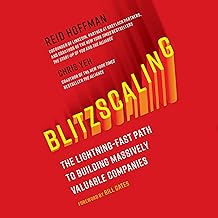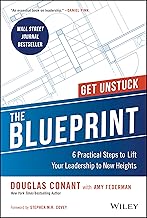
Blitzscaling: The Lightning-Fast Path to Building Massively Valuable Companies
Reid Hoffman, Chris Yeh, et al.
4.5 on Amazon
7 HN comments

The Most Important Thing: Uncommon Sense for The Thoughtful Investor
Howard Marks, John FitzGibbon, et al.
4.6 on Amazon
7 HN comments

Getting Past No: Negotiating in Difficult Situations
William Ury
4.6 on Amazon
7 HN comments

Sell or Be Sold: How to Get Your Way in Business and in Life
Grant Cardone
4.7 on Amazon
7 HN comments

So You Want to Talk About Race
Ijeoma Oluo
4.7 on Amazon
6 HN comments

COVID-19: The Great Reset
Klaus Schwab and Thierry Malleret
3.7 on Amazon
6 HN comments

Great by Choice
Jim Collins, Morten T. Hansen, et al.
4.6 on Amazon
6 HN comments

Imperialism the Highest Stage of Capitalism
Vladimir Ilich Lenin
4.8 on Amazon
6 HN comments

The Professional Chef
The Culinary Institute of America (CIA)
4.8 on Amazon
6 HN comments

Options as a Strategic Investment: Fifth Edition
Lawrence G. McMillan
4.7 on Amazon
6 HN comments

Trading: Technical Analysis Masterclass: Master the financial markets
Rolf Schlotmann and Moritz Czubatinski
4.5 on Amazon
5 HN comments

The Blueprint: 6 Practical Steps to Lift Your Leadership to New Heights
Douglas R. Conant
4.6 on Amazon
5 HN comments

Causal Inference: The Mixtape
Scott Cunningham
4.7 on Amazon
5 HN comments

Trillion Dollar Coach: The Leadership Playbook of Silicon Valley's Bill Campbell
Eric Schmidt, Jonathan Rosenberg, et al.
4.6 on Amazon
5 HN comments

No Rules Rules: Netflix and the Culture of Reinvention
Reed Hastings and Erin Meyer
4.6 on Amazon
5 HN comments
lbacajonDec 6, 2018
The new book by Reid Hoffman, Blitzscaling, was an eye-opener for me as to how these companies operate and what seems as incredibly inefficient now will all be but forgotten tomorrow when they have complete monopolies over all transportation... The nature of technology makes it winner take all almost always, it's only a matter of time until they can offer other forms of transportation to people. Perhaps people someday won't even own any cars at all especially if it's cheaper to call an autonomous one from your device whenever you need it.
These are interesting times we are living in and these business models are completely counterintuitive to traditional norms of taking small risks and that much is obvious from seeing the business models of Uber/Lyft, WeWork, Airbnb, etc.
alucianionNov 25, 2020
Another good book might be Blitzscaling by Reid Hoffman.
One thing to keep in mind is not to get distracted by all these items (they are good, but can be useful) but there are no shortcuts.
Most of the largest companies were built without a playbook but with determination and a north star.
Remember to also have fun! Hope this helps somewhat.
runelohrhaugeonAug 10, 2021
For example, one of our mentors is Chris Yeh, a VC and the co-author of Blitzscaling. He uses Mentorcam to give fundraising advice, feedback on pitches, input on GTM strategy, etc. to people that wouldn't have access to him otherwise.
Users have told us that they’ve had the most impactful "conversation" of the their life on Mentorcam and that they’ve found the inspiration to fight through difficult phases of their life through their interaction with their mentor. Our customers have used Mentorcam to do things like get fundraising advice, decide on where to go to college, transition careers, and find a girlfriend. The latter surprised us, but demand for dating advice has turned out to be high, even though it's not the main thing we're focused on.
Happy to answer questions and read comments!
zhdc1onJuly 15, 2021
It depends on whether you're giving up on the process or the goal. Startups "give up" or pivot on their original and subsequent ideas so often that's it's considered a best practice. This is different from founders giving up on starting a business.
Like you mentioned, the habit is what matters.
angarg12onJuly 15, 2021
I agree with "the power of habit" part.
From the "never give up" point of view, I've changed my mind, thanks to books like The Lean Startup, Blitzscaling, and my own experience.
The bottom line message seems to be "keep insisting and you'll be successful". I spent 3+ years working in a game that never took off as a side project. In hindsight, I should have taken the hint of the lack of traction early on and dropped the whole thing. Instead I sank countless hours into a project that never worked out. How many prototypes could I have produced in the same time?
Bottom line, habits are good, so long as we don't mix it up with the concept of "don't give up and you'll be successful".
gopionOct 5, 2016
Read Blitzscaling by Reid Hoffman - https://hbr.org/2016/04/blitzscaling
staneteonMar 15, 2021
There may be structural problems, missing information, lack of trust between teams, poor defined business goals, lack of a unified engineering or product strategy, communication problems between departments, huge dependencies between teams, a lot of bureaucracy and the list goes on and on. I’ve faced some of these problems. I tried to solve some, I had to accept some and I’m still frustrated with others. Here I'm sharing my experience about how to identify and deal with some of them. But I also want to know yours.